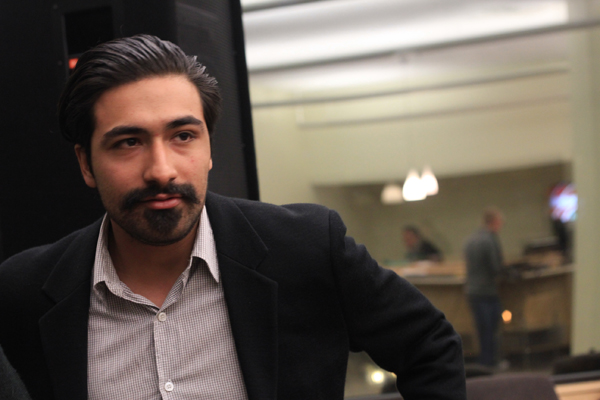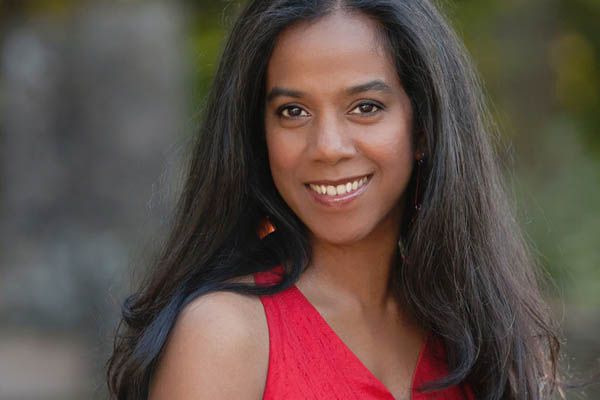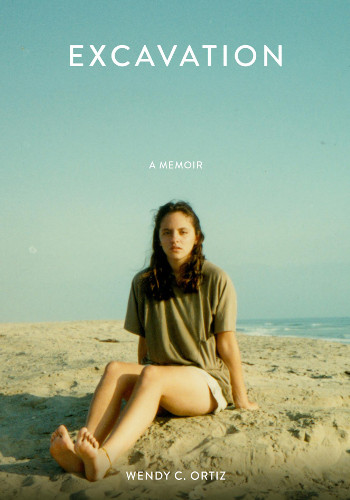In mid-April, writer and musician Joe Oestreich spoke with Bonomo about rock and roll, essaying, and the sneaky thrill of stumbling upon a Carly Simon album cover.
Joe Oestreich: Rock and roll began with Chuck Berry, so let’s start there. Is it possible to separate the brilliance of the music from the misdeeds of the musician?
Joe Bonomo: Chuck Berry is so larger-than-life, you have to remind yourself that he was actually a living, breathing person. You have to turn off all the white noise—everything that’s been said about Chuck, all mythologizing the critics have done, all the self-mythologizing he’s done. You’ve got to take him off that pedestal. I find that I can do that by reading about him, in his terrific autobiography and in other books, learning what his origins were, what mistakes he made, all the stuff that renders him—not small, exactly—but human. You don’t want to ignore the complexity of his life, but reading about the man is one way to pull yourself away from the myth and back into the music, back into what you dug about Chuck in the first place.
A while ago, I was driving through town, running errands, not paying a lot of attention to the radio, when suddenly “No Particular Place to Go” came on. There’s that great moment when a song surprises you—you didn’t drop the needle yourself, you didn’t press the play button—so you didn’t know it was coming. For the first 30 seconds of the song, you’re just catching up. You’ve heard it a thousand times, but you’re a millisecond behind, so everything is still exciting. That’s what happened with “No Particular Place to Go.” Because I couldn’t have willed that moment to happen, I was surprised into the brilliance of Chuck Berry, as if I was hearing him again for the first time. That was a gift from the universe.
JO: In that moment, it wasn’t a Chuck Berry song, right? It was your song. Like what John Fogerty said after not playing those Creedence tunes for so long because of the lawsuit with Fantasy Records: at some point the artist figures out that the songs don’t belong to the songwriter or the record label. The songs belong to the listener.
JB: Nobody really owns this stuff. I think Keith Richards said that he wants his tombstone to read simply: He passed it along. That’s how rock and roll works. Somebody plays it. Then somebody else pulls it down from the air and passes it along to the next guy.
JO: That’s an apt metaphor for the creative process. The best songwriters say that when they’re at the top of their game, they’re not consciously crafting songs at all; they’re channeling what’s already in the atmosphere.
JB: They just put their antennae up and it captures something. That’s not to say that some songwriters—from Tin Pan Alley to the Brill Building on down—don’t sit at a desk and write “work songs.” But yeah, it’s a mystery, isn’t it? How the song comes unbidden?
JO: Do you have to like a song to write about it?
JB: That’s a question I’ve been puzzling over for a long time. I’ve never given myself the challenge of writing about a song I detest, but I think I should. From the essayist’s perspective, it’s always best to test the limits of your understanding, the limits of your own biases.
JO: In the book you say, “photos are, of course, liars.” Are personal essays also liars?
JB: They can be. In two ways. An essay can lie in the conventional, less interesting way of consciously or unconsciously fudging the facts. In other words, poor research. But the more interesting way is in the inauthenticity of the writer’s voice. An essay can lie when the writer’s not being honest about himself, not being honest with himself. I’m not talking about a meta essay, where the essayist is aware of dissembling. I’m talking about the forced epiphany or some other rhetorical gesture that reads as false, when the writer is steering the essay someplace it might not have reached on its own. That’s what I guard against when I’m writing about music. I try to approach the subject from as many different directions as I can and then see where the essay takes me.
JO: Beyond lying or dissembling, a further complication is that the truth changes over time. As you argue in the book, the truth of a current news item changes as soon as it becomes a historical event. Same with music, right? When you’re older you can still love a song you dug as a kid, even though the meaning in that song may have changed for you.
JB: Exactly. I wrote a book about AC/DC’s Highway to Hell in part because I wanted to explore that very question. How is it that a rock and roll album I loved when I was just hitting puberty can still send me now that I’m in my 50s? Beyond irony, beyond nostalgia. That’s an amazing trick. I suppose all art can do it, but pop music seems to do it in an especially vivid, graphic way. A song can score your life without you even realizing it.
In the book I write a lot in the about listening to music at that age—11, 12, 13—because that’s when I started getting glimpses into how complex life was going to be later, how strange and astounding—not just on the level of sex and romance but in larger ways, too. Somehow songs were telling me that about life, before I was able to articulate those ideas to myself. Anything that lodges itself into you at that time—pre-sentiment—stays there. It becomes part of your foundational identity, and then it sticks to you in a way that you can’t rub off.
JO: Conversely, there’s this line in the book: “The song will stop him in his tracks one day when he’s ready to listen.” Is there an artist you first heard as a teenager that maybe you weren’t ready for? One that you appreciated only years later?
JB: Bowie.
JO: Me, too. I wasn’t cool enough for Bowie. I didn’t think he rocked hard enough. I probably didn’t recognize his masculinity as masculinity—at least not in the way I recognized AC/DC.
JB: I remember seeing him on Saturday Night Live when I was 13 or so, and I forget what album he was promoting, but he was doing one of those shock-theatrical, highly stylized personas. The whole thing was kind of kabuki-like, and it was threatening to me, the way he was channeling some sort of abstract human expression that was beyond my ken at that age. So I turned him off.
JO: As you’ve said, when you listen you music as a kid it can teach you things about life that you aren’t yet sophisticated enough to articulate or even consciously appreciate. So I wonder if music is sometimes best heard from a position of ignorance. One of my favorite lines in the book is, “How can something I don’t understand come to mean so much?” I love that idea—even down to the level of how lyrics we’ve misunderstood can take on meaning.
JB: If you’re hearing a lyric wrong, and that lyric over the years has come to mean something to you, then which words are correct? Now, I don’t want to carry that idea too far, because I believe in the intentionality of the artist. But that scenario happens to all of us: You hear a lyric wrong, and you scribble it down in your high school notebook, and it’s burned into you.
JO: I’m afraid to take the conversation where I want to go next, because I know we’re going to sound like two old guys shaking our fists, saying, “Back in my day . . . ,”
JB: That’s inevitable.
JO: True. And yet I love how Field Recordings reminds me that in the old days of albums and cassettes, music wasn’t just a physical object you could hold; it was a physical object you could destroy. Rip open the cassette. Scratch the record. Break into, as you say in the book, “the dark inside of a pop song.” How the heck do you get inside of 1s and 0s?
JB: You don’t. Even with a CD, all you could do was scratch it, but that renders it unplayable. With a 45 or an LP, the skips, the pops, the hisses, the clicks become part of the song. The groove of the record wearing out. The fading of the tape, where what’s recorded on the other side starts leaking in. The way you could injure the song, it gave the thing a dimensional quality that streaming with 1s and 0s lacks entirely, and I do think that is a loss.
When I was a kid, my copy of the Beatles’ second album had a big pop during “I Call Your Name.” Eventually I bought the CD and then later moved on to streaming, but I still hear that pop in the same spot. It became part of the performance—or, more accurately, it became part of my performance of the song.
JO: More evidence that the songs belong to the listener. I love that the book reminds me not just of the physical quality of the medium but also of the equipment. Those huge, wooden stereo consoles weren’t gear; they were furniture. Music seems more real when you physically interact with it.
JB: Even the act of lifting the needle and dropping it. That’s a much more intimate gesture—literally—than clicking on Spotify.
JO: That quiet moment just before the arm drops. And then, when you’ve got a record that skips, trying to figure out which coin you need to place on top of the needle to give it the weight it needs to ride over the skip. A penny?
JB: Two pennies? Maybe the new resurgence of vinyl tempers this a bit, but which generation will grow up without having any vinyl in their house? They don’t own records. Their parents don’t have a shelf of albums. When that kid holds an LP in his hands for the first time, it’s going to feel huge, like it’s 10 feet by 10 feet.
JO: In the book Freakonomics, one of the fun economic facts is that reading out loud to your kids doesn’t necessarily make them more literate. But there is a correlation between just having books in your house and your child’s literacy. So maybe if you keep the physical object of the record at home, then some afternoon when the kid is alone and bored, he can sift though the shelves, pick out the Carly Simon album cover, and say, “Oh my God. What is this?”
JB: Oh my God. Who is this? The kids that only know music through streaming or You Tube, they’re missing out on something, absolutely. But every older generation says that. That’s what the horse-and-carriage driver said about the automobile, etcetera, etcetera. That’s always going to be part of the human condition. So you’re right. We do have to guard against “Get off my porch” kind of thinking. I have to remind myself that somewhere there’s a 13 year old for whom his introduction to music was streaming. In 10 or 15 years when streaming goes away and is replaced by something else, that kid is going to bemoan the loss of streaming in ways I can’t comprehend. But that’s the nature of loss; that’s the nature of growing.
JO: Many of the essays in the book feature the juxtaposition between a writer and a musical act. You’ve got Larry Brown and Hank Williams, Sylvia Plath and the Beatles, Charles Lamb and music writer Lester Bangs. You bring in TS Eliot to help you talk about Elvis Costello. What’s the essayistic instinct there?
JB: It’s not a conscious thing. I don’t sit down and think, What 20th Century modernist could I use to talk about the Rolling Stones? It’s just a matter of me paying attention. Maybe I’ll read something Piet Mondrian said about the visual arts, and it will click with what I’m trying to say about how a certain song moves from the middle eight to the chorus.
I came of age a couple of decades after rock critics like Greil Marcus, Paul Nelson, Lester Bangs, Ellen Willis and others continued the process of dissolving the barriers between so-called “high art” and “low art.” These were some of the first writers to talk about rock and roll and other cultural forms in the same paragraph. For me, pairing, say, literature and music is not a conceit so much as it’s a way of noticing how many common threads there are among different kinds of human expression. Human beings wrestling with what it means to be alive. Painters and art critics wrestle with that in the same way as Sinatra or some one-off punk band playing a Wednesday night in the middle of nowhere: by translating the chaos of being alive.
JO: I so admire your essay “In the Morning I’ll Rise Above,” because I’ve thought for a long time that the two most important words in rock and roll—other than, you know, “rock” and “roll”—are “Saturday” and “night.” In that essay, you remind us that Saturday night is only Saturday night, because it bumps up against Sunday morning.
JB: The pleasure of Saturday night comes because we know it’s finite—even though we like to pretend otherwise. We’re staving off the inevitable. Eventually Sunday’s going to come, and it’s going to require us to take stock.
JO: Two competing belief systems, equally attractive because they’re opposed to each other.
JB: That’s right. Saturday night’s got its own set of promises, a very specific kind of salvation and redemption. And Sunday morning? When you’re reckoning, that’s a very different kind of salvation. But each are valid and valuable and nourishing in their own way.
JO: We talked earlier about how sometimes, especially when you’re a kid, you can hear music and understand without really understanding. Maybe that’s another definition of faith. And speaking of faith, you write a lot about your Catholic upbringing. Is there something about faith or Catholicism that got you into rock and roll? Something about one type of faith competing with the other?
JB: It was fun to be a rock and roll fan when I was a kid in Catholic school—but also scary. Part of the thrill of loving Highway to Hell back then was that at St. Andrews the Apostle, well, AC/DC was not on the curriculum. All the cool guys and girls who disappeared after school, doing things that I could only fantasize about, they were not only fans of that band, they seemed to be acting out the songs. The morality play was being staged right in front of me.
So I don’t know that there’s a direct correlation between growing up Catholic and falling in love with rock and roll, but I like your idea about faith being involved. The Book of Hebrews defines faith as “the evidence of things not seen,” right? There’s that moment of being first turned on by a song when it’s telling you something that you didn’t know you knew. Essays can do that, too. There’s an element of faith involved in music and writing, an element of giving over to the mystery. And allowing yourself to be convinced that the mystery isn’t all threatening or confounding or melancholy. The mystery can tell you something—if you listen. And if you give it time.
In addition to being the bass player and singer for the Columbus, Ohio-based band Watershed, Joe Oestreich is the author of three books of creative nonfiction: Partisans, Lines of Scrimmage (co-written with Scott Pleasant), and Hitless Wonder. He teaches at Coastal Carolina University in Conway, SC. Visit him at joeoestreich.com.
Grid: cassettes via Foter.com / CC BY
















